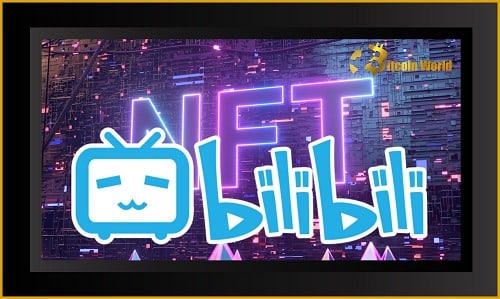In a fascinating twist in the world of digital collectibles and blockchain technology, Bilibili, the beloved video streaming platform of China’s Gen Z, has just made a significant move into the NFT space. But here’s the kicker – they’re launching these Non-Fungible Tokens outside of China! Let’s dive into why this is happening and what it signals for the future of NFTs and Chinese tech companies.
Bilibili Goes Global with ‘Cheers UP’ NFTs
Yes, you heard it right. Bilibili, known for its vibrant anime, comics, and games (ACG) content, is stepping into the NFT arena. Just recently, they unveiled their “Cheers UP” NFT collection, built on the Ethereum blockchain, specifically targeting the global market. These aren’t your typical JPEGs either. Bilibili is offering a collection of dynamically generated characters, each unique with varying traits. Think of it like this:
- Diverse Looks: Each character boasts different faces, clothing styles, skin tones, and headwear.
- Unique Accessories: They even come with different items in hand, adding to their individuality.
- Collectible Variety: This means every NFT in the ‘Cheers UP’ collection is a one-of-a-kind digital collectible.
To bring this project to life, Bilibili has partnered with CryptoNatty, an NFT marketplace that will handle the issuance of these digital assets. It’s a strategic move to tap into the global NFT craze while navigating complex regulatory landscapes.
China’s Crypto Climate: Why Go Global with NFTs?
Now, you might be wondering, why launch NFTs outside of China? The answer lies in China’s stringent regulations surrounding cryptocurrencies and related technologies. Let’s break down the situation:
- Crypto Crackdown: China has implemented a widespread ban on cryptocurrency trading and mining. This crackdown is driven by concerns over financial stability, illicit activities, and the speculative nature of crypto assets.
- NFTs in a Gray Area: While not explicitly banned like cryptocurrencies, NFTs in China operate in a tightly controlled environment. The government is wary of speculative trading and financial risks associated with digital assets.
- Fiat-Only NFT Trading: In mainland China, if NFTs are permitted, they can only be traded using fiat currency (like the Chinese Yuan), not cryptocurrencies. This significantly limits their appeal and functionality within the existing global NFT ecosystem.
- Restrictions on Transmission: Major Chinese tech companies are generally cautious, often disallowing NFT trading and banning their transmission on platforms to avoid regulatory scrutiny.
Essentially, the regulatory environment in China makes it challenging, if not impossible, for platforms like Bilibili to fully embrace the global NFT market within their domestic operations. Hence, the strategic decision to launch internationally.
Bilibili’s NFT History: A Domestic Footprint
Interestingly, this isn’t Bilibili’s first foray into the NFT world. Back in December, they actually launched their NFT business domestically, releasing four batches of NFTs on the “UPower chain.” However, these domestic NFTs operate under very different rules:
- “UPower Chain”: This suggests a private or permissioned blockchain, likely designed to comply with Chinese regulations and offer more control.
- Fiat Currency Focus: As expected, these domestic NFTs would be traded in fiat currency, aligning with China’s restrictions.
- Limited Trading: Trading and transferability of these domestic NFTs are likely restricted to prevent speculation and maintain regulatory compliance.
This dual approach – domestic NFTs within a regulated framework and international NFTs on a public blockchain – highlights the complex strategies Chinese tech companies are employing to engage with emerging technologies while adhering to national policies.
Global Ambitions and the NFT Question
Bilibili’s move into global NFTs also comes at a time when the company is actively expanding its international presence. Since 2020, Bilibili has been expanding its video streaming services in Southeast Asian markets like Thailand and Malaysia, competing with giants like Tencent and iQiyi.
While Bilibili hasn’t explicitly stated whether the “Cheers UP” NFT collection is directly tied to its broader international expansion strategy, it’s hard to ignore the potential synergies. NFTs can be a powerful tool for:
- Community Building: NFTs can foster a sense of ownership and community among international fans of Bilibili’s content.
- Brand Engagement: Unique digital collectibles can enhance brand engagement and loyalty, particularly within the tech-savvy Gen Z demographic.
- New Revenue Streams: NFT sales and potential secondary market royalties can create new revenue streams outside of traditional advertising and subscriptions.
What Does This Mean for the Future?
Bilibili’s strategic launch of Ethereum-based NFTs for the global market, while maintaining a separate domestic NFT approach, is a telling example of how Chinese tech companies are navigating the evolving landscape of blockchain and digital assets. It raises some important questions:
- Will other Chinese tech giants follow suit? Could we see more Chinese companies launching international NFT projects while adhering to domestic regulations?
- How will China further regulate NFTs? Will there be clearer guidelines and potential pathways for domestic NFT innovation within China?
- What’s the long-term impact on the NFT market? Will this trend of geographically segmented NFT strategies become more common as regulations vary across the globe?
Only time will tell how this unfolds, but Bilibili’s move is undoubtedly a significant step, highlighting the global appeal of NFTs and the innovative ways companies are adapting to regulatory challenges. It’s a space to watch closely as the digital collectibles revolution continues to evolve!
Related Post – Elon Musk, a Dogecoin supporter, has decided not to join the Twitter board of directors
Disclaimer: The information provided is not trading advice, Bitcoinworld.co.in holds no liability for any investments made based on the information provided on this page. We strongly recommend independent research and/or consultation with a qualified professional before making any investment decisions.


